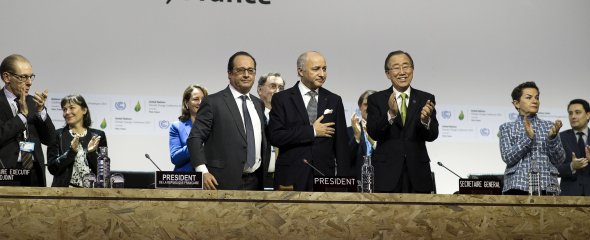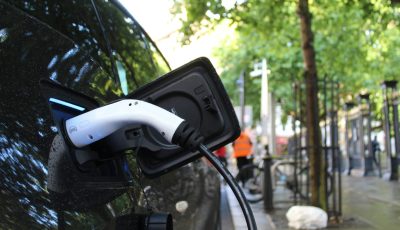Euphoria as Paris finally seals the deal
 “It is rare in any lifetime to have a chance to change the world”, declared France’s
“It is rare in any lifetime to have a chance to change the world”, declared France’s
President François Hollande as the UN climate talks finally closed.
By Paul Brown
PARIS, 12 December, 2015 – When 196 nations agreed a new treaty aimed at preventing dangerous climate change, mass rejoicing broke out, and signs of celebration still fill the bleak halls and corridors where the deal was finally hammered out.
Politicians and some climate change campaigners believe it will alter the course of history, while others fear it may still be a case of “too little, too late”.
But after years of failures and wrangling it was a breakthrough to get a treaty on which the whole world agreed. It was a tense day, because until the last second some delegate, somewhere in the hall, could object, thus destroying the consensus the treaty needed in order to be accepted.
The treaty binds all nations to change fundamentally their economies and put protection of the environment, particularly reduction of their greenhouse gas emissions, at the forefront of policy. It will come into force on 1 April 2017, when enough countries have ratified it, and there will be a five-year review process to make further emissions cuts.
In the meantime countries are urged not to wait until 2020 to cut emissions, but to act now to avoid even deeper cuts later on.
These cuts are needed immediately because the agreement states that there is a “significant gap” between countries’ plans to reduce greenhouse gases and what is actually required to keep the world safe.
In fact the agreement acknowledges that the risks of global warming are far greater than previously understood, and it aims to keep temperatures “well below” the 2°C previously agreed and to pursue efforts to limit the increase to 1.5°C.
To achieve this lower level, there must no net increase in emissions in the second half of this century – effectively spelling the end for the coal industry, and major reductions in the use of all fossil fuels.
Historic moment
Lord Stern, president of the British Academy, who has repeatedly warned that climate change is getting out of control, was delighted. He said: “This is a historic moment, not just for us and our world today, but for our children, our grandchildren and future generations. The Paris Agreement is a turning point in the world’s fight against unmanaged climate change, which threatens prosperity and wellbeing among both rich and poor countries.”
Laurent Fabius, the French foreign minister and president of the conference, who was in large part the architect of the agreement, having worked tirelessly for many months meeting world leaders, received a long standing ovation.
He had made an impassioned plea before the final text was issued for none of the delegates to object. “Our responsibility to history is immense”, he said. The agreement was not just about climate: it was about food security, public health, combatting poverty, the essential rights of people, and ultimately world peace.
Both Ban Ki-moon, the UN secretary-general and François Hollande, the French president, also exhorted delegates to put aside their differences and agree the compromise text. A month after the Paris shootings, Hollande said, it was a chance to send a different message to the world: “12 December 2015 will be a date to go down in history as a major leap for mankind.”
He said the credibility of the international community was at stake and told delegates: “It is rare in any lifetime to have a chance to change the world. I ask you to grasp it.”
Whether the Paris agreement proves to be a turning point in human history will certainly take a few years to judge. The national climate plans of 186 countries logged in advance of the talks will not prevent the planet from dangerous overheating, but they are a massive change in policy and can be ramped up to cut emissions dramatically.
The agreement boosts energy efficiency and renewables like solar, wind, biomass and geothermal energy. Business representatives attending the conference said this was an important signal that investments in green technology would be a safe bet, and anyone with investments in coal, in particular, and other fossil fuels in general would be sensible to get their money out as quickly as possible.
For many countries attending the conference this was still not enough. Even if the 1.5°C target was reached, which scientists say is highly unlikely, a number of low-lying small island states in the Pacific and Caribbean will disappear off the map. Sea level rise is already threatening their existence and forcing some of their citizens to migrate.
Among the glaring omissions in the agreement is its failure to tackle the ever-growing emissions from shipping and aircraft. Shipping, which uses particularly dirty oil, could be improved with technology, but for aviation there is currently no reduction strategy or alternative fuel.
The conference simply accepted early on that there was no chance of reaching any meaningful agreement on the subject, leaving it out altogether and placing the planet in great jeopardy of overheating as a result.
Helen Szoke, executive director, Oxfam, summed up for the doubters: “This deal offers a frayed life-line to the world’s poorest and most vulnerable people.
Only the vague promise of a new future climate funding target has been made, while the deal does not force countries to cut emissions fast enough to forestall a climate change catastrophe. This will only ramp up adaptation costs further in the future.”
And this was the summing-up from one leading British scientist, Professor Chris Rapley, of University College London: “Time will reveal the true nature of the COP21 deal. From epic turning point, to naive expression of hope, it is the real-world actions that follow which will decide.
“The transformation of the energy system, the economic system and politics that must now follow will be fought by the risk-blind and powerful forces of the status quo. The tide has turned, and they can either swim with it, or against it. But the current has surged.” – Climate News Network



